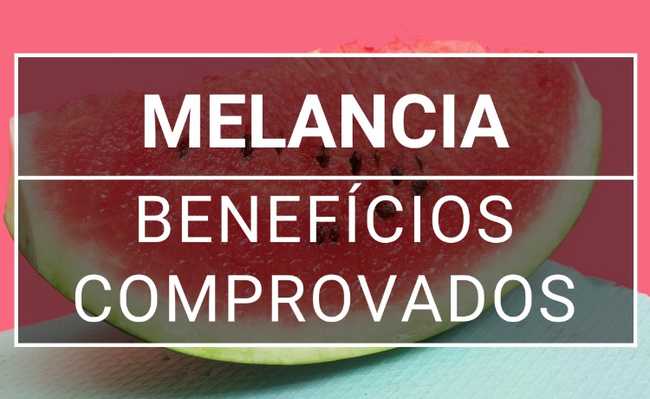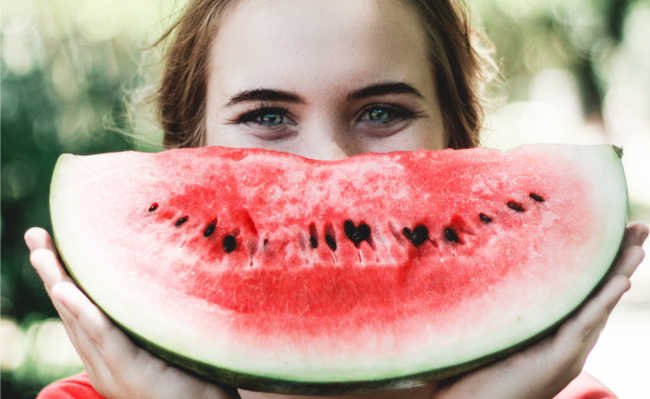Watermelon: Nine Scientifically Proven Benefits
The benefits of watermelon are not just flavor and hydration. Check out!

Watermelon is the fruit that grows on the plant belonging to the species citrullus lanatus, originally from Africa, being cultivated for over 5 thousand years.
In 1991, the production of watermelon in Brazil was estimated by IBGE at 144 thousand tons, being concentrated in the states of Goiás, Bahia, Rio Grande do Sul and São Paulo.
Being a fruit that is born mainly in the months of November, December and January, it is the darling of summer. But the benefits of watermelon are not just flavor and hydration. With only 46 calories per cup, watermelon is rich in vitamin C, vitamin A, lycopene, among other compounds that provide benefits such as cancer prevention, oxidative stress, inflammation, among others. Check out:
- Watermelon Seed: Benefits and How to Roast
- No waste: know how to practically serve watermelon
Benefits of watermelon

Edited and resized image of Caju Gomes, is available on Unsplash
1. Moisturizes
In addition to drinking plenty of water, consuming water-rich foods is a great way to keep your body hydrated. About 92% of watermelon is water. If you don't like drinking water too much, a watermelon juice or the watermelon itself are great alternatives to keep hydrated and enjoy the flavor of the fruit's natural sugars.
2. It is rich in nutrients
Watermelon is one of the lowest calorie fruits - just 46 calories per cup (154 grams).
One cup (154 grams) of watermelon has:- Vitamin C: 21% of the Recommended Daily Intake (RDI);
- Vitamin A: 18% of the RDI;
- Potassium: 5% of the RDI;
- Magnesium: 4% of the IDR;
- Vitamins B1, B5 and B6: 3% of the RDI.
- Magnesium: what is it for?
Vitamin C
Vitamin C is an antioxidant that helps prevent cell damage caused by free radicals.
Carotenoids
Carotenoids are a class of plant compounds that include alpha-carotene and beta-carotene, which your body converts to vitamin A.
Lycopene
Lycopene is a type of carotenoid that transforms into vitamin A. This potent antioxidant gives plant foods such as tomatoes and watermelon a red color and is linked to many health benefits.
Cucurbitacin E
Cucurbitacin E is a plant compound with antioxidant and anti-inflammatory effects.
3. Helps prevent cancer
Researchers who have studied lycopene and other plant compounds present in watermelon have found that there is a correlation between lycopene consumption and a lower risk of cancer of the digestive system.
In addition, cucurbitacin E, another compound present in watermelon, has also been shown to be able to reduce the risk of tumors (see studies about it here: 1, 2).
4. It can improve heart health
Cardiac diseases are the leading cause of death worldwide.
Proper lifestyle and eating habits help reduce the risk of stroke and heart attack by lowering blood pressure and cholesterol levels. Some substances present in healthy foods such as watermelon help reduce the risk of cardiovascular disease. One study suggests that lycopene helps lower cholesterol, blood pressure and oxidative damage.
Other studies in obese women, postmenopausal women and Finnish men have shown that lycopene also helps to reduce the stiffness and thickness of artery walls, reducing the risk of heart disease (see studies here: 3, 4).
Watermelon also contains citrulline, an amino acid that can increase levels of nitric oxide in the body, which helps blood vessels to expand, thereby lowering blood pressure.
Other vitamins and minerals in watermelon are also good for the heart, such as vitamins A, B6, C, magnesium and potassium, according to a study.
5. It can decrease inflammation and oxidative stress
Inflammation is a major cause of many chronic diseases. Because it is rich in anti-inflammatory antioxidants (lycopene and vitamin C), watermelon can help reduce inflammation and oxidative damage.
In a 2015 study, lab rats that were fed powdered watermelon to supplement an unhealthy diet developed lower levels of inflammation and oxidative stress than rats that weren't fed watermelon. By reducing oxidative stress, lycopene, present in watermelon, can help delay the onset of Alzheimer's disease progression (see study about it here: 5).6. Helps prevent macular degeneration

Edited and resized image from 煜翔 肖, is available in Unsplash
According to a study, the lycopene found in watermelon also helps prevent age-related macular degeneration (AMD), a common eye problem that can cause blindness in the elderly.
7. Helps relieve muscle pain
An amino acid known to help reduce muscle pain, citrulline, in addition to being available in supplements, is present in watermelon. But the fruit's advantage is that in addition to having citrulline naturally, watermelon juice seems to increase the absorption of the substance.
In one study, athletes who drank plain watermelon juice and watermelon juice mixed with citrulline experienced less muscle pain and faster recovery compared to athletes who drank another drink of citrulline.
The researchers also performed a test-tube experiment investigating the absorption of citrulline. The results showed that absorption is more effective when consumed with watermelon juice.
8. Good for skin and hair
Vitamin A and Vitamin C, present in significant amounts in watermelon, are important for skin and hair health.
Vitamin C helps the body produce collagen, a protein that keeps the skin supple, helping to prevent premature aging.
Vitamin A helps create and repair skin cells, preventing flaking. Lycopene and beta-carotene, also present in watermelon, help protect the skin from sunburn (see study about it here: 6).
9. It can improve digestion
Watermelon contains a lot of water and a small amount of fiber - both are important for healthy digestion.
Fiber provides bulk for fecal cake formations and water helps maintain fluid movement in the digestive tract.










